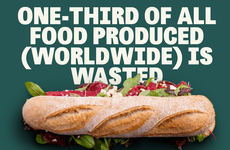
INS Ecosystem Hopes to Reduce 130 Million Pounds of Food Waste
Ellen Smith — April 5, 2018 — Tech
INS Ecosystem is a new startup that believes Blockchain technology can be leveraged to combat the grocery industry's food waste problem.
The new platform hopes to offer a more streamlined approach to selling surplus consumables directly to shoppers at discounted rates. The software will use Blockchain to "manage transactions and to underpin a token system to fulfill orders, adjust prices and offer rewards." The Blockchain-based software will aid in tracking, monitoring, and distribution of the grocery industry's expansive inventory, offering a connected and digital alternative.
The startup is set to launch later this year, and if all goes as planned, INS Ecosystem could cut the cost of groceries by 30% while also eliminating up to 130 million pounds of food waste annually.
Image Credit: Greenbiz
The new platform hopes to offer a more streamlined approach to selling surplus consumables directly to shoppers at discounted rates. The software will use Blockchain to "manage transactions and to underpin a token system to fulfill orders, adjust prices and offer rewards." The Blockchain-based software will aid in tracking, monitoring, and distribution of the grocery industry's expansive inventory, offering a connected and digital alternative.
The startup is set to launch later this year, and if all goes as planned, INS Ecosystem could cut the cost of groceries by 30% while also eliminating up to 130 million pounds of food waste annually.
Image Credit: Greenbiz
Trend Themes
1. Blockchain-based Food Waste Reduction - Leveraging Blockchain technology to offer a more efficient way to sell surplus consumables at discounted rates, and track, monitor, and distribute inventory to reduce food waste.
2. Token-based Transaction Systems - Using tokens to manage transactions and adjust prices and rewards for grocery shopping can create a more efficient, connected, and digital shopping experience.
3. Streamlined Food Distribution - A more direct and connected approach to selling surplus consumables can reduce food waste and lower costs for both consumers and grocery stores.
Industry Implications
1. Grocery - Blockchain-based platforms can disrupt traditional grocery models by reducing food waste and offering a more efficient and cost-effective shopping experience.
2. Logistics and Supply Chain - Blockchain technology can aid in tracking, monitoring, and distributing inventory in the grocery industry, creating a more efficient and streamlined supply chain.
3. E-commerce - Token-based transaction systems can revolutionize the e-commerce industry by creating a more efficient and connected shopping experience that offers rewards and discounts.
4.3
Score
Popularity
Activity
Freshness























